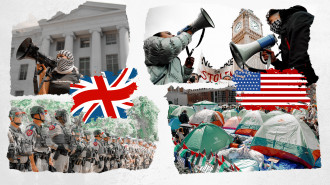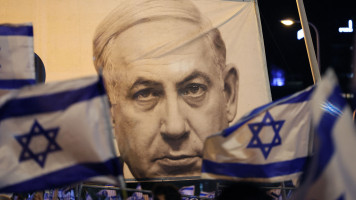Syrian children, wounded and vulnerable deported from Jordan
Hamza, a 16-year-old Syrian refugee, suffers recurring nightmares that he is to be sent back to his war-torn homeland.
His hometown, Daraa, was one of the first cities to rise up against the Syrian regime, but a bloody and prolonged war between the army and rebels forced them to seek refuge in neighbouring Jordan.
"The Jordanian authorities ruled that I had to leave the country because I broke Jordanian law but at the last minute God saved me and my family from what awaited us."
His family of eight live in a rented home in the northern Jordanian city of Irbid, after they left Zaatari camp a year ago.
But financially, Hamza's family have suffered since they left the camp and the teenager has been forced to make ends meet by working in a poultry shop.
Hurled into the unknown
Hamza's father is disabled, which makes him unable to work.
His son gets paid just $141 a month, which isn't enough to cover the family's rent.
"Our economic situation is really hard. We pay $169 in rent a month for our two bedroom, one bathroom and kitchen home and my monthly income is only $147, which is the aid I get from the UNHCR."
Then four months ago, Hamza was arrested for working illegally and told he would be deported back to Syria.
Hazma's nightmare came true, and he was taken to Rabaa al-Sarhan transit facility on the Syrian-Jordanian border ready to be deported.
But at the last moment a refugee lawyer took up Hamza's case and managed to get the ruling reversed.
He was allowed to stay in Jordan so long as he lived in al-Azraq refugee camp, 100km east of Amman, until his legal status is approved.
Hamza's father thanks God his son was not deported.
"If they had thrown out Hamza we would have gone back to Daraa. My son is young and naive and wouldn't have been able to live alone. We thank the lawyer for taking up his case."
Hazim Shakhatreh, the lawyer who saved Hamza from deportation says that an issue was that Jordanian law prohibits child labour, and that prosecutors, incorrectly, accused of leaving Zaatari illegally.
According to official statistics Jordan is hosting about 1.5 million Syrian refugees. Only around 670,000 are registered with the UNHCR and 80 percent live outside of designated refugee camps.
Jordan's deportation committee is made up of representatives from different security services.
The administration of refugee camps is operated by the ministry of interior.
Shakhatreh said that the committee's rulings "hurl people into the unknown".
Since November 2014 he has handled 18 cases of Syrian refugees facing deportation.
"Only seven refugees have been saved, the rest have been sent back home," he said.
Their crimes? Labour law violations, living outside camps, security constraints and "moral" violations. The committees referred to all the cases with in Orwellian terminology - threats to Jordan's security.
International concerns
Shakhatreh thinks there have been some positive developments because the committee has recently permitted defendants to challenge rulings.
The first deportation case Shakhatreh handled was of a refugee arrested at Amman airport on his way to Turkey.
"His name was Haidar and he was in his mid-thirties. After he spent a few months in Jordan he decided he wanted to move to Turkey but his passport had expired and needed to be renewed."
Haidar spent $1,134 for a new passport through a middle man. Before he boarded the plane he was arrested for using a forged passport and deported to Syria.
Syrian refugee Umm Nahid refused to go back to al-Azraq refugee camp with her three daughters, even though it would save her husband from deportation.
| I'm scared to go back to the camp and then my girls are forced to stay. Umm Nahid, Syrian refugee in Jordan |
"My husband was arrested while he was working in a local shop he was then handed over to the security agencies. They decided to send him back to Syria."
Her husband called her before he was deported and asked her to agree to take the family back to refugee camp to make their statuses official.
They would then be able to leave the camp legally in exchange for him not being deported. But she said no.
"We escaped from the camp because life was really hard there. I'm scared to go back to the camp and then my girls are forced to stay."
Human rights groups have attacked the Jordanian government for its policy of deporting illegal migrants. Amman denies any wrongdoing.
Late last year, Human Rights Watch accused the Jordanian authorities of violating international conventions.
In its damning report Vulnerable Refugees Forcibly Returned to Syria: Halt Deportations; Investigate Shooting, the activist group found that among those deported by Jordan included wounded men and unaccompanied children.
"[These deportations] violate the international law principle of non-refoulement, which forbids governments from returning people to places where their lives or freedom would be threatened," the report read.
The interior ministry declined to comment. But a government source said that Amman abided by international law by deporting refugees who pose a "threat" to national security.
"International law allows countries not to accept foreign fighters even if they have laid down their… for political and security reasons that give the host countries the right to defend their security and stability."
He said that the deportation committee reviews each case on "methodological" and "legitimate" grounds until the group reaches a unanimous decision.
The anonymous source denied that they would made ad hoc decisions or discriminate against the individual based on their nationality.
Officials are reluctant to reveal the number of Syrians who have been deported.
Anis al-Qasim, a professor of international law, said international law stated a refugee cannot be deported to their place of origin if their life was in danger. But there are exceptions.
"If the state has serious concerns the person poses a threat to national security then it can take actions to deport them."
Deportees also have the right to be deported to a third country if they believe their safety would be in danger if they were sent back.
But he says that the state has to be completely sure of this allegation, as deporting innocent people would damage the country's reputation internationally.
For Jordan, which is attempting to present a modern face to the world, this could prove to be disastrous.
This article is an edited translation from our Arabic edition.
![Zaatari Refugee Camp [Getty] Zaatari Refugee Camp [Getty]](/sites/default/files/styles/image_345x195/public/media/images/AF917646-0E86-4175-9C43-6CE02519DBD4.jpg?h=d1cb525d&itok=blubah6v)


